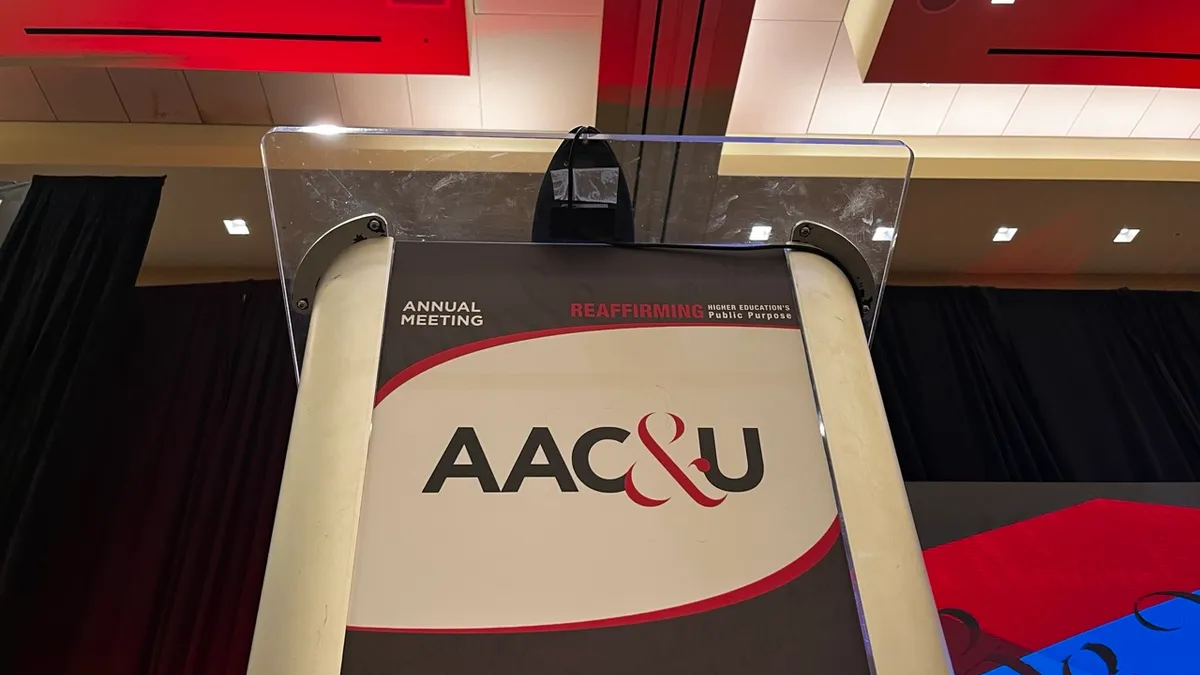Technology companies are known to have a "move fast and break things" culture, so it's perhaps unsurprising some have been trying out a four-day workweek. Colleges, meanwhile, have a reputation for changing their ways at a glacial pace.
But D'Youville College broke that mold Wednesday, when it announced it is switching to a 32-hour workweek for administrators, staff and librarians — a change affecting some 140 employees on the New York campus. The private nonprofit college is also keeping affected employees' pay and benefits the same.
Previously, D'Youville employees worked 37.5 hours across five days. Now they will work 32 hours in four days. By staggering employee schedules, D'Youville is extending its business hours for students by 30 minutes at the beginning and end of each day. Business hours will now stretch from 8 a.m. to 5 p.m.
"This is aimed at helping our nontraditional students that will typically get to campus later in the afternoon take their courses in the evening," said D'Youville President Lorrie Clemo. "They'll now be able to access our face-to-face offices during that time."
D'Youville officials hope the change will also attract workers, help retain employees, reduce parking density on campus and improve sustainability by having fewer workers commute to campus each day.
"We believe it's going to be a very attractive schedule for our employees," Clemo said.
D'Youville is trying out the new employee schedules over six months. The college will assess the change by surveying students and employees.
"The organization is saying, 'We want you to be able to rest, we want you to take breaks, we want you to recuperate and not just work every day.'"

Paul Hutchinson
Senior lecturer, Boston University
We spoke to higher education and workplace experts about what benefits a four-day workweek could bring and what colleges would need to do to make such a change.
"More and more institutions, I think, have been running on very thin margins in terms of staffing — people doing multiple jobs, hiring freezes, reengineering processes," said Peter Eckel, senior fellow and director of leadership programs at the University of Pennsylvania's Alliance for Higher Education and Democracy. "It's interesting to see this college in many ways go the opposite way and feel they can still deliver the caliber of services to students."
Four-day workweeks could help employees thrive
By keeping pay level but reducing overall work hours, D'Youville is messaging that it's placing greater value on its workers' labor, said Paul Hutchinson, a senior lecturer at Boston University's business school.
"The organization is saying, 'We want you to be able to rest, we want you to take breaks, we want you to recuperate and not just work every day. The purpose of your life is not just to go to work,'" Hutchinson said. "That's a values expression."
By adopting this approach, D'Youville joins the ranks of organizations experimenting with the workweek, including crowdfunding platform Kickstarter and financial technology unicorn Bolt.
Progressives in Congress are also championing the idea. They recently endorsed a bill from Rep. Mark Takano, a Democrat from California, that would reduce the standard workweek under the Fair Labor Standards Act from 40 hours to 32 hours for employees eligible for overtime.
Still, the four-day workweek has never really taken hold in the U.S. — despite decades-old predictions that it was just around the corner.
In contrast, about 86% of workers in Iceland are currently working less than a 40-hour workweek or have gained the right to shorten their hours. That's according to a report from Autonomy, a U.K-based think tank that analyzed two large-scale trials in Iceland in which employees moved from 40-hour weeks to 35- or 36-hour weeks. The report also found the change brought about increased worker well-being.
Productivity may increase
Research on Iceland's change to a four-day workweek also found it coincided with maintained or increased productivity.
Still, a concern for D'Youville officials was ensuring student services wouldn't suffer due to employees switching to a four-day workweek.
D'Youville got a taste of whether that would happen in the summer of 2020, when employees worked just four days a week and took a 20% pay cut for about two months to save institutional resources during a financially challenging period. The college participated in a state program during that time that allowed employees to receive partial unemployment benefits while working reduced hours.
Although employees worked less, measures of student satisfaction increased, Clemo said. Still, Clemo said it's hard to determine whether that resulted from fewer hours or because employees were concerned about how students were faring during the pandemic.
The experience paved the way for the college to formally roll out the change this week.
"Our employees told us that having that reduced amount of work helped them focus on their families," Clemo said. "When they were at work for the 32 hours, they were much more focused because they knew they had that one extra day out of the week that they could manage some of their outside personal matters."
Cross-training is key
D'Youville is requiring employees to participate in professional development to make the four-day workweek possible.
"For this to work, our employees have to be able to cover other areas of the college or have knowledge of the services that we're providing," Clemo said. "Cross-training will be very important for continuity of services across the institution."
In some cases, that means one-person departments will have to work with other teams to provide services. For example, D'Youville has one employee specializing in disability services.
"We will now be training additional employees at the college that will be able to cover that, so again, there will be no delaying those services for students," Clemo said.
Using these strategies can also create organizational resilience, said Alex Soojung-Kim Pang, author of "Shorter: Work Better, Smarter, and Less — Here's How."
"If one person leaves, that means there is still someone else in the company who knows how to do that job," Pang said.
However, effort is required to get to that stage, Pang said. In D'Youville's case, the college's employees collaborated with their managers to set their schedules and determine which training they needed.
"It is completely employee-driven," Clemo said. "The only expectation or mandatory sort of guideline or mandatory rules that we put in place for this program is that the services would be continuous and that we would have extended hours."






















